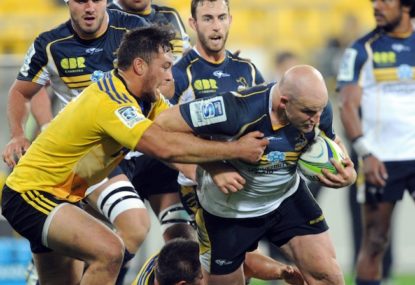The Brumbies have undergone an unprecedented amount of change leading into 2014.
The changes include a new coaching structure, a new HQ, a host of new players and (soon) a new CEO.
All of which preceded Ben Mowen’s decision to end his Brumbies career later this year.
We’ve already had the disappointment of getting belted by the Reds at home, the relief of bouncing back against the Western Force and the tragedy that is David Pocock’s knee injury.
There was also the huge scare with Patty McCabe’s neck, and the wonderfully committed performance against the Hurricanes on Friday night.
It’s clear that Super Rugby is alive and well.
It’s sometimes possible to sense that something is missing without being able to identify specifically what that something is.
This is how I felt about our preparation leading into the Reds match.
There is a buzzing energy that is almost tangible when teams are primed to perform well.
I think it’s largely the feeling that everyone in the group is totally committed to the cause, that everyone is focused and fully prepared.
It’s this mysterious and infectious edge that great teams learn to produce consistently, and it’s also why the mental side of a performance is always the most crucial.
In the aftermath of losses it’s possible to drive oneself to the brink of madness by searching for reasons.
While it’s important to identify what may have caused a loss, it’s equally important to quickly regroup and refocus on the next challenge.
I’m impressed by the way the Brumbies have has managed to do this since Round 1.
“Mental toughness” has become a fashionable catchphrase in sports.
It’s interesting to pay attention to how mental toughness is often defined.
Is it the ability to play through pain, or perform under the stress that comes with “big matches”?
Is it the ability to rebound from setbacks or brush aside factors beyond our control?
All that mental toughness is, or ever has been, is the ability to remain in the present moment.
Remaining fully in the present is the only way to direct intentions under duress.
We know that certain conditions make it difficult to focus on, and execute, tasks.
And we tend to admire individuals or teams who are able to overcome these distractions.
Ironically, it’s the attempt to not focus on certain things that most interrupts our ability to pay attention to the present moment.
This is easy to demonstrate.
Try reading this sentence without thinking about a polar bear.
No, I mean really, deeply concentrate on not thinking about a big white polar bear.
Gotcha!
Now imagine you’re a professional athlete attempting an important skill in a match watched by millions of people.
Imagine your skill attempt goes horribly, terribly wrong.
Let’s say you attempt the skill again, and fail again, again and again.
Suddenly, in the space of a single match, you’ve got a metaphorical polar bear in your head – and the distance between your attention and the present has grown.
“Choking” under pressure is simply the inability to rid the mind of polar bears (now there’s a sentence I could not have imagined writing when I woke up this morning).
Fortunately, mental toughness is a learned ability, no different from physical skill execution.
Research increasingly reveals the mind’s incredible capacity for adaptation.
Thought patterns that lead to positive outcomes are simply the result of a particular brain circuitry – just as patterns that lead to negative outcomes are the result of physical processes in the brain.
I suspect that the next quantum leap for sports, and really any environment that values “high performance”, will be centred on the growing understanding of our ability to manipulate the brain.
The Brumbies need to harness this power for the rest of the season if they are to be successful.
I’ll end things there for this week, my brain wants a sandwich, and who am I to argue?





























































































